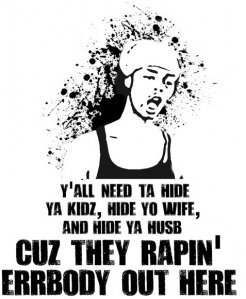I just hosted a Nigerian gay activist on his stay in NYC recently, and it was really instructive to hear how queer politics are playing out in the country. Contrary to popular belief that the only discussion about non-normative gender or sexuality in Africa is one that results in violence. But in the public sphere of mass pop culture driven by tabloid and “reality” scandals, there seems to be, according to my new friend, an obsession with gay identity in Nigeria at the current moment.
Case in point, Derenle Edun and Charly Boy. Edun is a Nigerian TV personality and Charly Boy is a popular musician. Tabloid Entertainment 24/7 (E247) published some scandalous photos of the two in a range of poses that apparently is a recent talk of the town. Nigerian entertainment website Under Da Rock also blogged about the article with the title
Derenle Edun gets erotic with Charly Boy for a mag!
This is currently a major story in many Nigerian newspapers based on my google search. But rumors have swirled around the two for years, and Denrele was asked by Naija Rules.com flat out if he was gay:
Q: There was this rumour sometime ago that Denrele is a homosexual?
A: I think the truth is that no matter how good you are, people will want to look for a loophole somewhere and penetrate you, but when they don’t find one, they will just say something. I am not bothered about the rumour at all, because if I am gay or homosexual, I will come and say it because I don’t lie, but what the allegation has done to my person is that it has put me in trouble with some people because they started to torment me. I am a kind of person that when they call me and say you are a gay, I don’t shout at them because I am one of the people that affect people positively. I don’t care who you are, your status, age, standing in the society or your sexual preference, I have a lot of gay friends and lesbians, but I don’t mind because it is part of life and life has to be lived. When they started to peddle the rumour, the first one I heard was that I went to a gay party and some people came to me, disturbing me. You know people just make fabrications. My family was not even bothered because they know me very well. What I will say is that when I am getting married, I will invite all of you to come and be part the of occasion.
While he clearly denies being gay, he does emphatically defends people’s right to their own sexuality and identity. So people, it is important to try to find ways to help LGBT folks in Africa defend themselves against unjust laws and violence (like what’s happening in Uganda and the Democratic Republic of Congo), but it’s important not to support certain discourses that paint Africa as forever and always socially “backward” or anti-queer.

